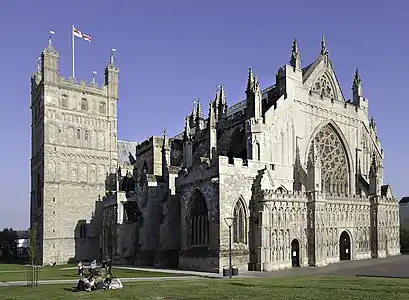Robert Cecil Mortimer (6 December 1902 – 11 September 1976)[1] was an Anglican bishop in the Church of England.[2]
Mortimer was educated at St Edward's School, Oxford[3] and Keble College in the same city. He was made deacon at Michaelmas 1926 (3 October) at his title church (St Mary Redcliffe)[4] and ordained priest the Michaelmas following (2 October 1927) at St Alban's, Westbury-on-Trym — both times by George Nickson, Bishop of Bristol;[5] and was a curate at St Mary Redcliffe.[6] He then became a lecturer in canon law and then the Regius Professor of Moral and Pastoral Theology[7] at the University of Oxford before his ordination to the episcopate in 1949 to serve as Bishop of Exeter,[8][9] which See he held for 24 years. He was consecrated a bishop on St Mark's Day 1949 (25 April), by Geoffrey Fisher, Archbishop of Canterbury, at Westminster Abbey.[10]
Mortimer was also a notable author,[11] and frequently appeared on BBC Television. He had four children, one of whom was the journalist and author Edward Mortimer.
References
- ↑ "Obituary: The Right Rev Robert Mortimer Former Bishop of Exeter", The Times, 13 September 1976, p16.)
- ↑ "New Bishop of Exeter", The Times, 11 February 1949, p4.
- ↑ “Who was Who” 1897-1990 London, A & C Black, 1991 ISBN 0-7136-3457-X
- ↑ "Ordinations". Church Times. No. 3324. 8 October 1926. p. 393. ISSN 0009-658X. Retrieved 10 November 2019 – via UK Press Online archives.
- ↑ "Ordinations". Church Times. No. 3376. 7 October 1927. p. 393. ISSN 0009-658X. Retrieved 10 November 2019 – via UK Press Online archives.
- ↑ Church Web Site
- ↑ "University News", The Times, 11 February 1944, p7.
- ↑ National Archives
- ↑ Genuki
- ↑ "Day of consecrations / picture caption". Church Times. No. 4499. 29 April 1949. p. 265. ISSN 0009-658X. Retrieved 10 November 2019 – via UK Press Online archives.
- ↑ Among other books he wrote Gambling (1933), Origins of Private Penance (1939), The Elements of Moral Theology (1947), Marriage in Church and State (1947), Christian Ethics (1950), The Duties of a Churchman (1951) and Western Canon Law (1953).
